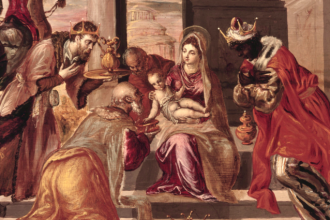Glenn Arbery
The faith of our students has a Spartan or Roman openness to it, something Magian, that deeply respects the full reality of things. They understand that our deepest analogy to God is submission to the truth, but they know from this education that seeing the truth of God’s will in crucial decisions might require patience like that of the Wise Men—and then, when the time comes, indomitable resolve.
You would have to be in a sorry state not to make a few New Year’s resolutions. Who has not felt that yeast of the will, that rising resolve, that this year, this time, we will do that difficult thing which has eluded us? Every time I think of resolution in this sense, I am reminded of the poem my stepfather used to recite, “Invictus,” by William Ernest Henley. Its last lines stuck with me: “I am the master of my fate,/I am the captain of my soul.”
Bracing words! But even at eight or nine years old, I never quite believed them. There were too many things that I was obviously not master of. For example, Lawton Davis could run a lot faster than I could, and my attempt to outstrip mere nature by lacing on a promising new pair of PF Flyers soured me on advertising. Being the master of my fate seemed a bit of a stretch, to say the least—though the phrase always, somehow, evoked the image of Teddy Roosevelt at San Juan Hill, not to mention, somewhat later, the mad faux Teddy charging up the stairs in Arsenic and Old Lace.
It’s both interesting and puzzling to reflect that the will per se—and willpower obviously underlies all New Year’s resolutions—did not have pride of place in Western thought until modernity. Some would argue that William of Ockham turned things in this direction in the 14th century when he insisted that reality is entirely a matter of God’s sovereign will; » Read More
https://theimaginativeconservative.org/2024/12/resolutions-irresolutions-glenn-arbery.html






